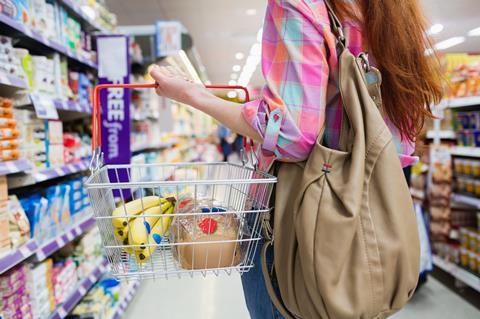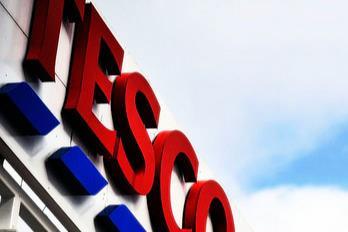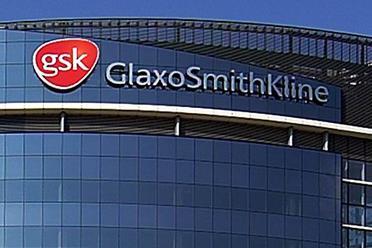
Top story
Grocery sales fell 0.7% in the four weeks to 9 October as UK consumers rebalanced spending priorities amid rising energy and fuel costs, according to Nielsen.
Nielsen’s monthly grocery market share figoes showed UK shoppers spend £11.8bn on groceries in the four weeks to 9 October, some £41m less than the same period last year – albeit still up 6.6% from pre-pandemic figures two years ago.
Tesco was the only big four supermarket in growth, as its sales rose 1.9% in the period. Asda was down 1.6%, Sainsbury’s down 1.4% and Morrisons down 3.7% in the period.
Lidl and Aldi posted growth of 12.1% and 8.9% respectively, while Marks & Spencer showed strong growth of 9.4%.
Convenience orientated retailers which showed strong growth in Covid continue to fall back year-on-year, with Co-op down 4.3% and Iceland down 1.6%.
NielsenIQ also reveals that spend on promotional items remains low at 20%, down from 22% during the same period last year amid growing concerns around availability issues and disruption in the supply chain. UK households are also being encouraged to shop earlier ahead of the festive period - meaning they are not waiting for the start of seasonal promotions.
Neilsen also found that shoppers are now moving fluidly across digital and physical channels when doing grocery shopping, as both visits to stores (+5.5%) and online shopping trips (+5.3%) increased over the last four weeks.
The share of online sales of 12.6% is down only slightly from 12.9% a year ago, but over 1 in 4 shoppers continue to buy groceries online every 4 weeks and they are now shopping online more often, but with smaller basket sizes.
Mike Watkins, NielsenIQ’s UK head of retailer and business insight, commented: “October will be a tipping point for food retail spend. This is down to a plethora of factors, including cautious consumer sentiment, increased concerns about discretionary spend, and ambient food inflation - which accelerated to 0.8% in September and also ‘lockdown 2’ comparatives starting in November.
“These trends will also give added momentum to value based retailing - with shoppers looking to spend less but still get good value for money. As a result, supermarkets may rely less on broad promotions and instead focus on driving loyalty via smart targeting of discounts and personalised price cuts, such as Tesco Clubcard and Nectar prices and if needed, the return of vouchering.
“We also cannot ignore that availability issues are still top of mind with shoppers, with news headlines questioning whether shelves will be stocked this Christmas. Should some shoppers choose to forward purchase seasonal food and drink, for example purchasing one or two extra items on every visit, this may be enough to help keep growth positive. Large out of town stores could also benefit this year should shoppers decide to buy non food such as toys, gifts and homewares.“
Morning update
Household goods manufacturer McBride has issued another profits warning after experiencing higher than expected cost inflation amid tightening supply chains.
Ahead of its AGM today, the private label cleaning goods supplier said supply chains have continued to tighten since its previous update on 9 September.
As such, raw material and packaging costs have moved faster and to a higher level than previously expected, while the shortage of haulage capacity and higher fuel costs has continued to substantially inflate distribution costs, which show no sign of abating in the near term.
As a result, McBride said it has begun to seek a second round of “substantial” price increases from all its customers across all divisions, which, dependent upon specific mix, could result in a minimum of mid to high teen percentage increases.
McBride said manufacturing facilities and logistics activities have operated well in the period and have shown strong resilience despite all these uncertainties and supply chain disruptions, with coronavirus restrictions at our Asia operations recently lifted and its new facility in Malaysia ramping up production.
McBride’s earnings for its 2022 financial year are expected to be weighted to the second half of the year, but it now forecasts a first half EBITDA loss of up to £10m.
“Given the unpredictability of current global supply chain and ongoing uncertainty over input costs, the Board is unable to update the full year outlook it provided in its preliminary results on 9 September 2021,” it stated.
McBride shares have fallen 6.1% to 65.2p so far this morning. They were trading at 87p before a profits warning in August.
Elsewhere on the markets this morning, the FTSE 100 is flat at 7,203.6pts.
Early risers include Virgin Wines, up 2.8% to 186.5p, THG, up another 2.3% to 356.7p and Just Eat Takeaway.com, up 1.9% to 6,029p.
Fallers include McColl’s, down 2.1% to 20.3p, Nichols, down 1.6% to 1,180.8p and Hotel Chocolat, down 0.9% to 480.8p.
Yesterday in the City
The news that The Hut Group founder CEO and executive chairman Matthew Moulding agreed to to remove the ‘golden share’ he held was warmly greeted by the City yesterday.
The cancellation will allow THG to seek a listing on the premium segment of the main market of the London Stock Exchange in 2022 and THG’s share price surged 20.5% on the news to jump back to 348.8p.
The wider FTSE 100 edged back 0.4% from Friday’s post-Covid closing high, falling 0.4% to 7,203.8pts.
The day’s fallers included Coca-Cola Europacific Partners, down 12.7% to €46.35, Greencore, down 3.6% to 130.3p, Bakkavor, down 3% to 124.4p, Glanbia, down 2.9% to €13.45, Greggs, down 2.6% to 3,068p, WH Smith, down 2.5% to 1,616.5p, and Compass Group, down 2.2% to 1,457p.
Risers included C&C Group, up 2.4% to 255.2p, Devro, up 1.9% to 216.5p, Deliveroo, up 1.8% to 288.1p, Premier Foods, up 1.3% to 112p and Cranswick, up 1% to 3,546p.



















No comments yet